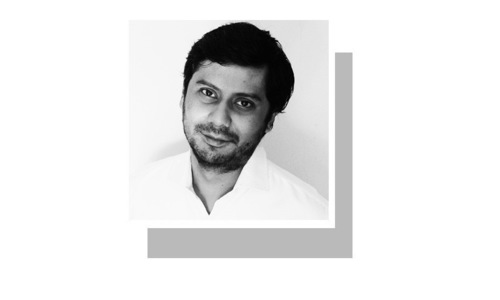A dialogue on democracy among the institutions of the state has been proposed before and will likely be proposed again. The idea is certainly a welcome one — democratic institutions engaging other institutions of state and branches of government — but much depends on how seriously the various centres of power approach such an exercise.
Chairman of the Senate Raza Rabbani has tried to use the constitutional platform he has been elected to for bringing attention to a twin democratic deficit in the country: the national political leadership’s lack of interest in making parliament an effective and functional core of the democratic project, and the lack of dialogue among the branches of government and within the institutions of the executive.
Now, in the wake of Nawaz Sharif’s ouster and with a strident debate in the Senate on the issue, Mr Rabbani has proposed inviting the military and judicial leaderships to parliament for a dialogue on democracy and possibly drawing up a new, inter-institutional consensus on the different branches of government and power centres remaining within their respective constitutional domains.
The Senate debate that led to Mr Rabbani’s proposal, however, demonstrated the difficulty of the task. A core reason for the democratic deficit in the country is the willingness of politicians to seek the undemocratic assistance of other institutions of state and attack each other whenever they sense political vulnerability.
PPP senators excoriating the PML-N for repeated anti-democratic attacks against the PPP over the decades may be right, but they have conveniently sidestepped their own mistakes. The judicially manoeuvred removal of Shahbaz Sharif from the Punjab chief ministership nearly a decade ago was a significant mistake by the PPP. It brought Nawaz Sharif into the streets of Punjab and resulted in campaigns that undermined the PPP’s position.
Meanwhile, the PML-N’s belated realisation that Articles 62 and 63 of the Constitution ought to be amended reeks of political self-interest. And Mr Sharif’s journey down GT Road appears to be more about his own political fate than any grand scheme to strengthen the democratic order.
Consider also the role of the various opposition parties at the moment. Having sensed the PML-N’s political vulnerability in Punjab and seeking to counter any advantage that may accrue to the PML-N because of Mr Sharif’s GT Road rally, the opposition’s focus is on the PML-N and Mr Sharif. Few appear concerned that the institutional balance of power has tilted further against parliament and fewer still appear to have time for Mr Rabbani’s long-term considerations.
Indeed, there are voices in the media and the political class that appear to be exhorting the courts and the military to take further action against Mr Sharif and his party. The possibility of institutions potentially ganging up against democracy is as depressing as the realisation that some so-called democrats are hoping for that eventuality.
Published in Dawn, August 12th, 2017












































